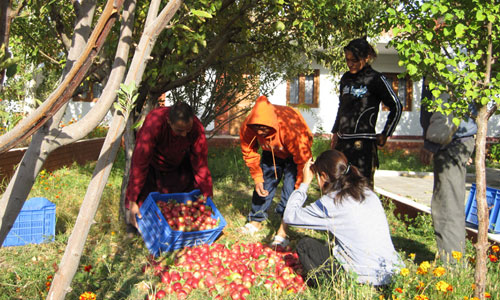
In line with our continuous effort to contribute towards Environmental conservation, every year thousands of trees are planted in the campus. Poplar and Willow are the common variety of trees being planted each year. In order to save water, the drip irrigation system is installed at all feasible parts of the campus and is an extremely effective and efficient system to irrigate such a huge area.
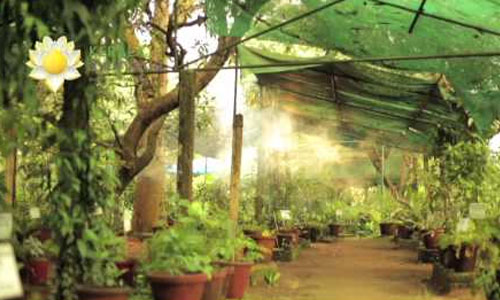
The original Herbal Garden which was built in 2009 complete with a water sprinkler system (the first piece of modern agricultural technology to be introduced in Ladakh) was completely washed away in the devastating flood in 2010. Now, the Garden has been relabeled and planted with sunflower and pea plants in order to restore the fertility of the soil. A new sprinkler system has also been installed.
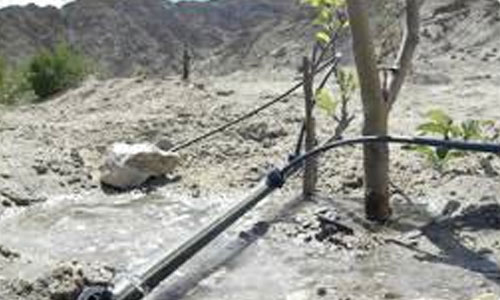
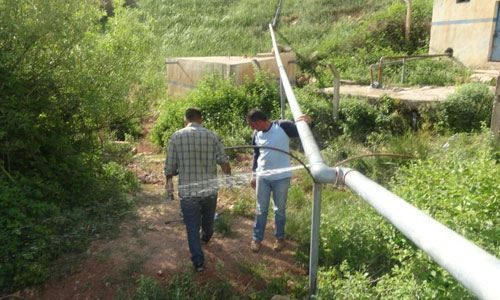
When the Mahabodhi Devachan campus was first conceptualized, the biggest challenge it faced was the constant shortage of water. The success or failure of the entire plan depended crucially on whether MIMC could have a constant and dependable water source that could be tapped easily for the daily running of the campus. Ven. Sanghasena also realized that it would take substantial funding to make this happen.
The dream finally became a reality when MIMC found a remarkable and most generous sponsor in the person of Sister Ramona Lai from Malaysia. Through her generosity and support, the water project became the biggest and most ambitious project for MIMC. Upon its successful completion, this precious commodity now became available to all parts of the MIMC campus, day and night throughout the year. It was the first time this "luxury" was installed and Devachan residents were saved from having to fetch water from the surrounding rivers and streams, especially during the bitter cold winter months. In many of the surrounding nearby settlements in Leh, the other alternative was to queue for hours to collect a gallon of water from the public tap opened for a short period of time every morning.

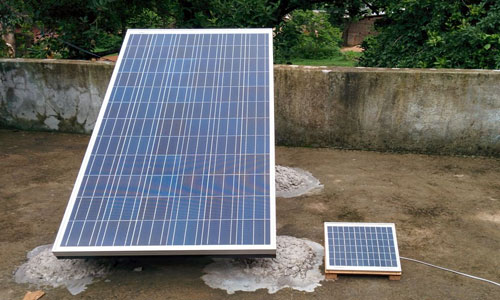
Atotal of 10,500 lpd (litre per day) capacity solar water heating system is installed in 7 different wings of the campus. The residents of the Girls Hostel, Boys Hostel, Old Age Home, Visually Impaired Hostel, Hospital, Jetavana Monastery and Phandeyling Nunnery enjoy hot water throughout the year, even in the winter months when the outside temperature drops to -30 degree Celsius. The temperature of the hot water is maintained at 60-70 degree Celsius in the early mornings.
This Project has been running successfully for the last 5 years. According to TATA BP, the company that installed the system, it is a bewilderment for them as it is the first ever project to be installed anywhere in India that has proven to be successful even in such harsh winter conditions as in Ladakh.
In fact, a patient in the hospital was so astonished to find hot water in the bathroom of the hospital that he commented "It is like being in heaven! In other places in Ladakh, even cold water is difficult to find in winter whereas here, you get hot water round the clock for the whole year!"
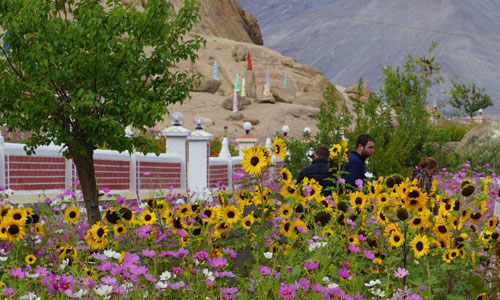
After the completion of the water project, again through Sister Ramona's help, Ven. Sanghasena was able to bring yet another ambitious project to fruition i.e. to green the entire campus.
The objective to make MIMC Devachan self-sustaining began with the planting of fruit trees in the Sister Ramona Lai Orchard. Spread over a period of a few years, around 1,200 apple and apricot trees have been planted and are now bearing fruits to be enjoyed by the residents of Devachan. To optimize the use of this precious water resource, a special Drip Irrigation System has been installed and has been proven to be highly successful.
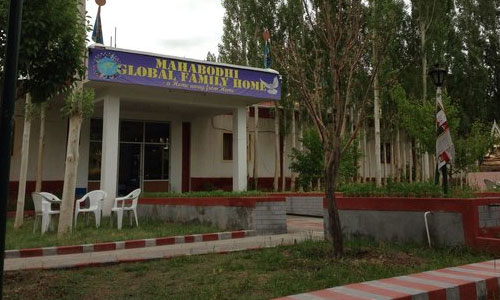
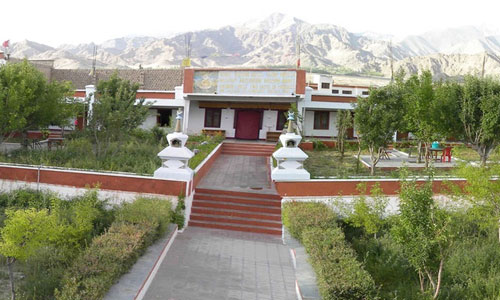
Being a Charitable Organization itself, MIMC runs all its activities depending on charity and donations as its main source of income. Hence, it was thought advisable to find an income generating project that would help contribute to the smooth running of its activities. Though it is not very easy to get support for a commercial and profit-making project, once again Sister Ramona Lai understood the need and purpose of such a project and came forward to support it. She generously funded the construction of the first floor of the Global Family Guest House, which was completed in late 2012. The Guest House is furnished with 44 Rooms with attached Bathrooms and 18 Rooms with non-attached bathrooms, besides many other facilities like a library, dining hall, meditation hall and multipurpose hall that can be used for activities like seminars and workshops.
Besides our own supporters and guests, we welcome all spiritually inclined tourists who would like to enjoy calm, serene and clean living accommodation while holidaying in Ladakh. One can attend all our daily yoga and meditation classes as well as Sunday special pujas and meditation sessions at the main meditation hall where the entire Devachan family gathers every Sunday.
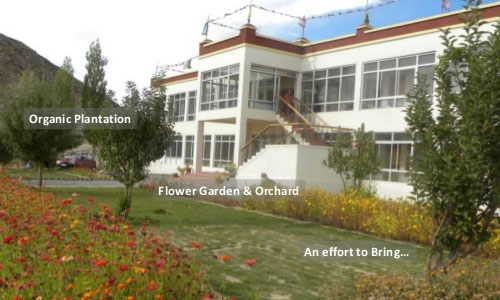
As As Ladakh's climate is so harsh, the growing season is limited to a maximum of five months a year i.e. from May to September. While some vegetables can be stored underground or dried for use in winter, they become extremely scarce at the end of the cold season. In an attempt to extend the growing season, Mahabodhi with the help from other organizations and Government Agencies has constructed a few solar greenhouses in the last few years. The greenhouses make it possible to extend the growing season, and therefore greatly increase the availability of fresh produce the whole year round. The greenhouses which we have installed have been used to grow a wide variety of vegetables, including turnips, spinach, radishes and cabbage.
Up to three crops can be obtained in a winter season. In March and April, cabbage, cauliflower and other vegetables can be sown in the greenhouse, and transplanted outside when the outside temperatures rise. We would like to acknowledge the support of the German Agro Action (NGO) project that helped us construct these greenhouses which will not only make us self-sustaining but hopefully have enough to supply nearby villages as well. We are also thankful to (Ladakh Renewable Energy Development Authority (LREDA) who have provided two commercial greenhouses to us on subsidy.

Master Stanzin Gurmet, an alumni of Mahabodhi Residential School, who has been doing Mass Communication and Film Making course from one of the reputed Media collage in India has completed his course and has joined Mahabodhi Zita and Horst Norberg Studio. He will now fully run the studio and are expecting to produce many traditional music, hymn, and chanting and recordings. We are also encouraging our students especially the drop out ones to take part in this lively extracurricular activity. Apart from the direction for the self sustenance, this studio will be boon to school dropout students to showcase their talents.
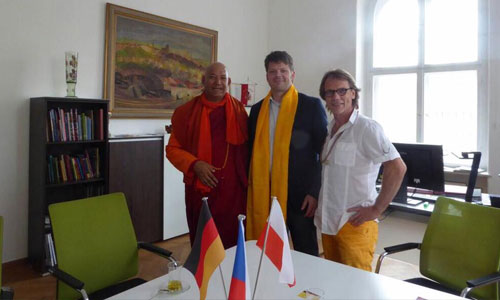
In today's world of information, the media plays a crucial role in creating greater awareness in both the local as well as in global scenario. Therefore, the media becomes an important part of any organization in promoting awareness on its various activities and thereby generating proper understanding in the minds of the interested individuals, especially the information shared are transparent and truthful in their own right.
Keeping these views in mind, Mahabodhi Publication Office was first established under the leadership of Ven. Sanghasena, solely aiming at bringing awareness to the greater community on the various spiritual and humanitarian activities undertaken by MIMC organization to uplift the spiritual and material conditions of the people in Ladakh.
The sole aim of this project is to create a self sustainable development in bringing about gains in both the spiritual and material perspectives in the long run.